Have you ever felt a weird pang of sadness right when things are finally getting better? Like, you’re moving forward, but part of you misses who you used to be? Yeah, that’s the sneaky side of growth nobody warns you about. In this piece, we’re talking about grieving your past self that quiet ache when you let go of old versions to make room for the new you.
We’ll start with why it feels like loss, share some real stories, explain what this grief even is, and spot the signs you’re going through it. Stick around; we’ve got tips, a cool infographic on ambiguous grief, and even a free self-reflection quiz to help you check in with yourself. For more on navigating big life changes, check out our take on Why Growth Feels Scary Sometimes. And if you’re curious about the science behind this, Psychology Today’s article on ambiguous loss is a solid read. Oh, and here’s a infographic:
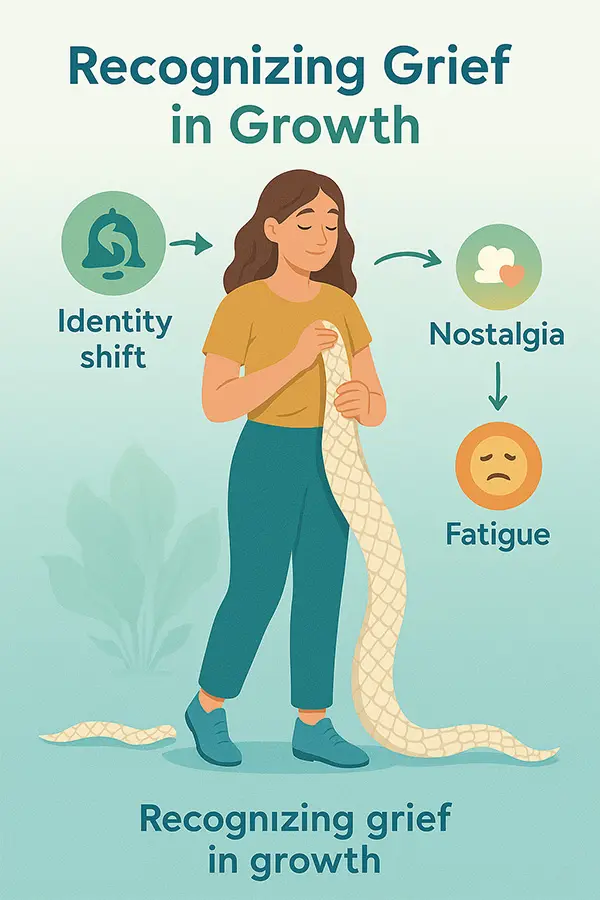
Introduction
Growth hurts sometimes that quiet grief for old you. Tools, real stories, and research help you honor the past while stepping forward. Ready to evolve? ?
Why Growth Often Feels Like Quiet Loss
Growth is supposed to be exciting, right? But sometimes it hits like a bittersweet wave. You land that dream job, end a toxic relationship, or finally prioritize your health and bam, there’s this lingering sadness. It’s not loud like losing a loved one; it’s more like missing an old pair of shoes that don’t fit anymore but still hold memories. I mean, think about it: every step forward means leaving something behind.
That ambitious hustler you were in your 20s? Or the carefree party-goer before responsibilities piled up? They’re gone, and yeah, it can sting. From a neuro perspective, our brains wire around familiarity, so changing that setup triggers a mini-grief response hormones like cortisol spike while dopamine dips, making progress feel oddly heavy. But here’s the thing: acknowledging this quiet loss is key to real embrace of the new you. It’s not weakness; it’s human. ?

Personal Story: Missing the Ambitious Version of Me
Okay, lemme share something real quick. Back in college, I was this non-stop go-getter pulling all-nighters for projects, saying yes to every opportunity, basically living off coffee and adrenaline. It felt empowering at the time, like I was unstoppable. Fast forward to now, in my 30s, I’ve slowed down. Therapy helped me set boundaries, prioritize rest, and yeah, I’m healthier. But man, I miss that fire sometimes.
Last week, scrolling through old photos, I teared up not ’cause I wanna go back, but ’cause that version of me pushed through so much. It’s like grieving a friend who moved away. And get this, in the LGBT+ community, this hits different; maybe you’re grieving the ‘closeted’ self who survived tough times, or the pre-transition you who fought for authenticity. It’s layered, y’know? A buddy of mine, who’s trans, told me he grieves the ‘old name’ days not ’cause he regrets change, but ’cause it shaped his resilience. Stories like these remind me: growth’s pain is proof we’ve lived deeply.
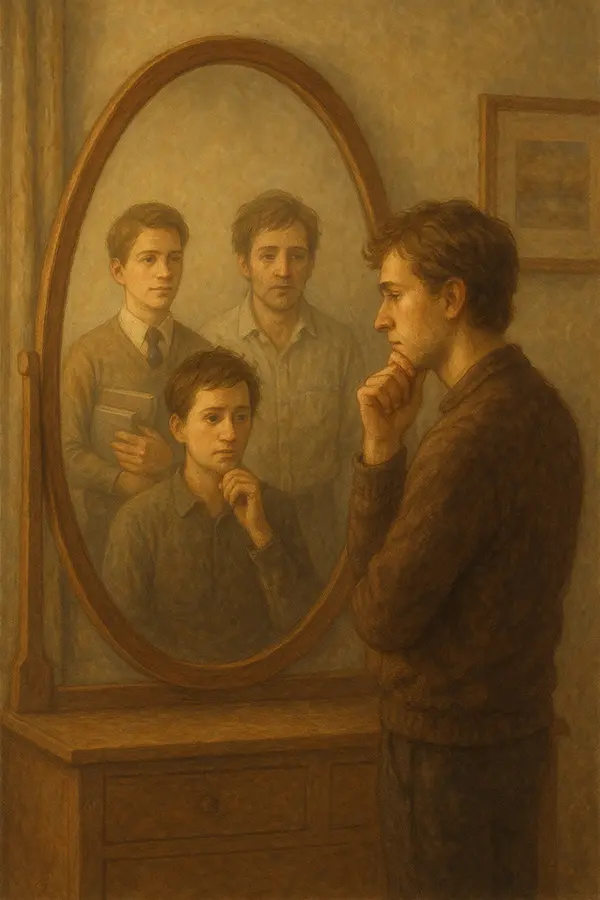
What Is Grieving Your Past Self? (Definition and Explanation)
Grieving your past self is that emotional process where you mourn the versions of you that no longer fit like outgrowing a favorite jacket. It’s not about dramatic loss; it’s subtler, tied to identity shifts from life changes, whether that’s quitting a job, healing from trauma, or just evolving naturally. Psychologists call it a form of self-concept grief, where your sense of ‘who I am’ transforms, leaving a void.
Think evolution: from caterpillar to butterfly, there’s loss in the cocoon phase. And honestly, it’s universal; even positive changes spark it ’cause our brains crave stability. Suppressing it? That leads to stuckness, like carrying extra baggage on a hike. But embracing it? Opens doors to freer living. For more on identity shifts, peek at our post on Embracing Change Without Fear. Externally, Verywell Mind’s piece on grieving life changes nails the psych angle.
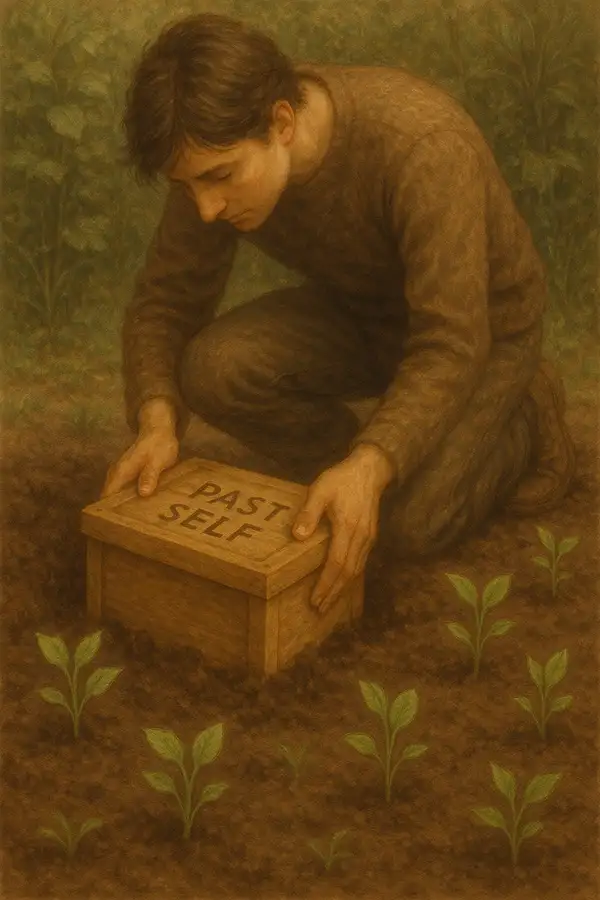
Understanding Hidden Grief in Personal Evolution
This hidden grief sneaks up during evolution ’cause it’s not obvious. You’re thriving maybe fitter, wiser, more balanced but bam, nostalgia hits for the ‘old you’ who partied till dawn or chased dreams without fear. It’s hidden ’cause society cheers growth but skips the mourning part. From a psych view, it’s linked to attachment theory; we bond with our self-identities like relationships, so letting go feels like breakup pain.
Neurons that fired for ‘ambitious me’ quiet down, triggering mild depression symptoms. But hey, it’s adaptive evolution wired us this way to reflect and integrate lessons. I recall after quitting a high-stress gig, I felt lost; turns out, I was grieving the ‘successful’ label I’d clung to. Recognizing it helped me rebuild stronger. And in cultural lenses, like for queer folks, grieving pre-coming-out selves adds layers of relief mixed with sorrow for lost time. It’s complex, but naming it lightens the load. ?
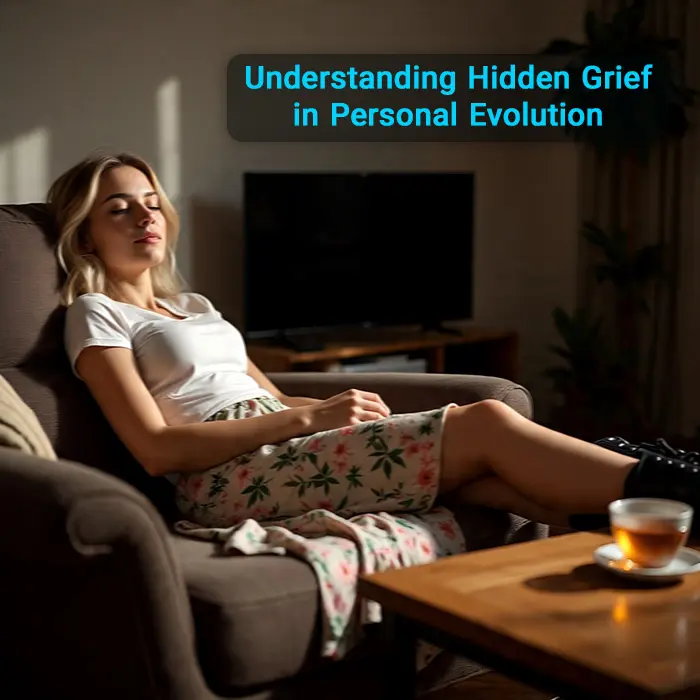
Can You Really Grieve Past Versions of Yourself?
Absolutely, you can and should. It’s not weird; it’s valid. Past selves aren’t dead, but they’re archived, and that shift evokes real grief. Therapists say it’s akin to disenfranchised grief losses society doesn’t validate, like ending friendships or changing careers. Can it get intense? Sure, if repressed, but processing it builds resilience. Science backs this: studies in Journal of Personality show identity transitions activate brain areas tied to loss. So yeah, cry for that carefree teen or driven workaholic; it’s healing. External link: APA’s take on identity grief.
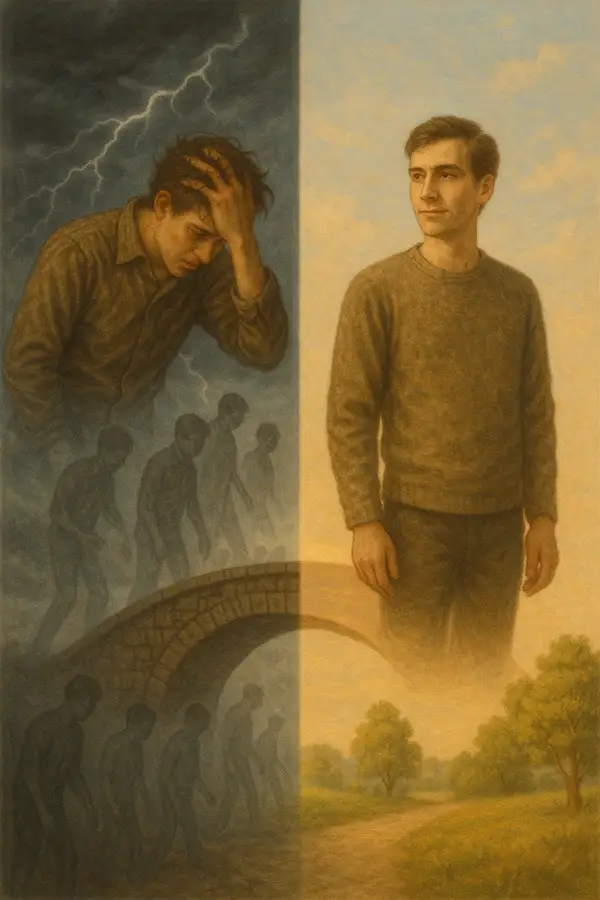
Ambiguous Grief: The Blurry Pain of Letting Go
Ambiguous grief is the blurry kind no clear end, just this foggy ache for what’s intangible, like your old confidence or innocence. Unlike traditional grief (say, after death), it’s ongoing, without rituals. For past selves, it’s grieving the ‘what ifs’ or comforts of familiarity. Picture it: you’re happier post-breakup, but miss the routine. Blurry ’cause it’s internal, hard to pinpoint.
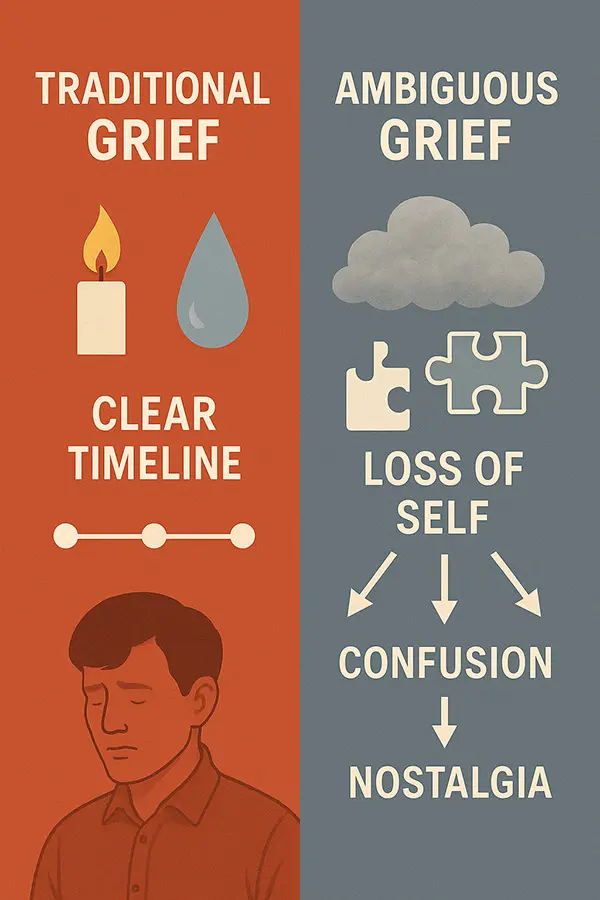
From neuroscience, it’s limbic system stuff emotions without resolution spike anxiety. But tools like journaling help clarify. In LGBT+ contexts, it’s grieving ‘passing’ phases or family dynamics pre-acceptance. It’s messy, but honoring it fosters growth. For related reads, our article on Navigating Ambiguous Losses.

Signs You’re Grieving an Old Version of Yourself
Spotting these signs is like finding clues in a mystery sudden sadness during wins, or clinging to habits that don’t serve. It’s your psyche whispering, “Hey, process this.” Emotionally, it shows as mixed feelings; behaviorally, resistance to change. Physically? Exhaustion hits hard. Recognizing ’em early prevents buildup. Link to our Signs of Unprocessed Emotions. External: Mind’s guide on recognizing grief.
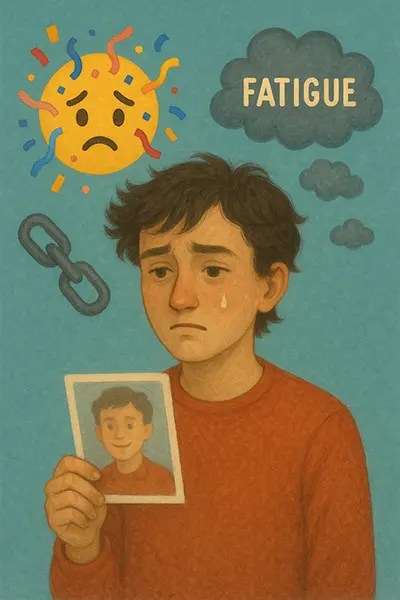
Emotional Symptoms: Sadness Amid Progress
Ever cry after a promotion? That’s sadness amid progress grieving the simpler life you left. It’s conflicting: joy for now, sorrow for then. Hormonally, serotonin dips while reflecting. But it’s normal; a client once shared grieving her ‘single’ freedom post-marriage, even happily wed. Address it with self-talk: “It’s okay to miss that.” In queer journeys, grieving ‘pre-label’ innocence adds depth. Embrace it; it passes. ?
What Does Repressed Grief Look Like?
Repressed grief hides as irritability, numbness, or over-busyness. You snap at small stuff, feel empty despite achievements, or distract endlessly. It’s like stuffing emotions in a closet they spill eventually, maybe as anxiety. Signs: avoiding old photos, dismissing nostalgia as ‘weak.’ But repressing prolongs pain; therapy uncovers it gently. External: BetterHelp on repressed emotions.
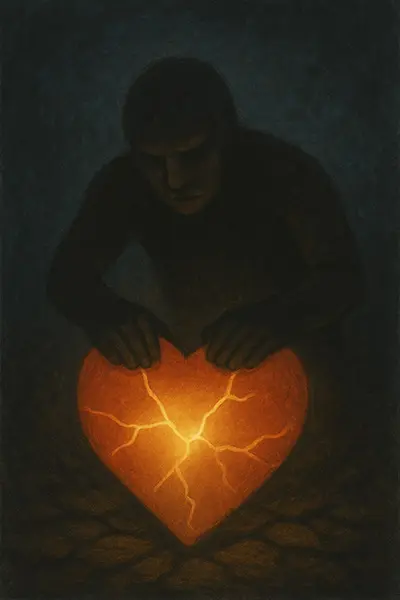
Behavioral Clues: Clinging to Old Habits
Clinging shows as repeating outdated routines like scrolling ex’s socials or overworking despite burnout vows. It’s comfort-seeking; brain defaults to familiar. Break it: question, “Does this serve current me?” A friend clung to party habits post-sobriety, grieving ‘fun’ self. Gentle release helps. ?
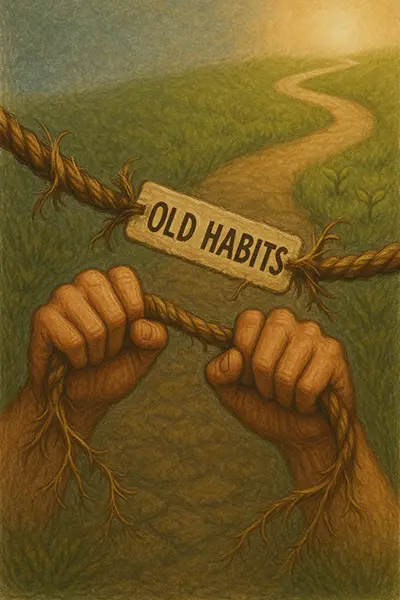
Physical and Mental Toll: Fatigue and Nostalgia Overload
Fatigue hits ’cause grief drains energy adrenal fatigue from emotional churn. Nostalgia overload? Endless ‘remember when,’ fogging focus. Mentally, rumination spikes; physically, headaches, sleep issues. Counter with rest, walks. Science: cortisol from grief tires the body. For LGBT+ folks, nostalgia for ‘pre-discrimination’ ease adds toll. Hydrate, breathe it eases. Link to Dealing with Emotional Fatigue. External: Healthline on grief’s physical effects.
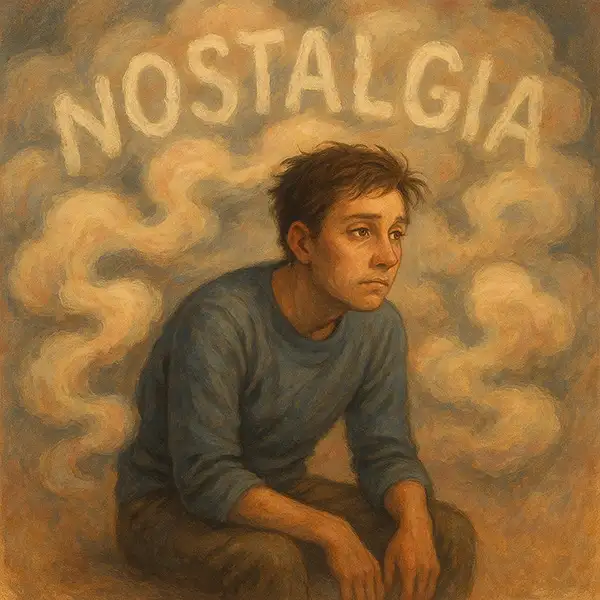
Meta Description: Struggling with sadness during personal growth? Learn about grieving your past self, spot the signs, and embrace change. Start healing today!
Excerpt: Ever feel sad even when life’s improving? That’s grieving your past self a hidden loss in growth. Discover why it happens and how to let go gently. ?
Reasons and Roots Behind This Grief
Ever wonder why ditching that old version of yourself feels like ripping off a band-aid that’s been on too long? It’s not just random; there are real reasons digging deep into how we’re wired. Like, I remember chatting with a buddy who quit his corporate gig to pursue art, and he kept saying, “Man, I miss the structure, even if it sucked.” Turns out, our brains cling to familiarity ’cause it’s safe, even when it’s holding us back.
From a neuroscience angle, attachment to past identities lights up the same reward centers as old habits do dopamine dips when we let go, leaving us feeling kinda empty. But hey, understanding these roots can make the process less scary. Psychologists over at Verywell Mind explain it well in their piece on identity loss, showing how societal stuff and personal history play huge roles. And if you’re in the LGBT+ community, this grief might tie into grieving pre-coming-out roles that kept you “safe” but hidden it’s layered, y’know? We’ll dive into identity stuff first, then pressures from outside, and how trauma sneaks in.
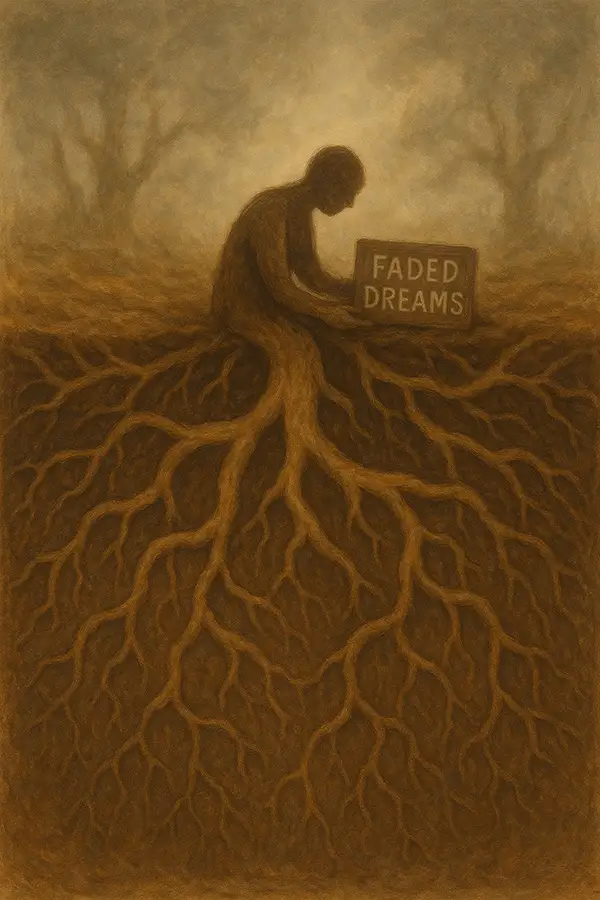
Identity Attachment: Why We Hold Onto Old Dreams and Roles
We get so attached to who we used to be because those roles gave us purpose, even if they don’t fit anymore. Think about it: that dream of being a top exec might’ve fueled your fire for years, but now you’re craving balance and bam, letting it go feels like losing a piece of yourself. It’s like how kids cling to their blankies comfort in the known. In psych terms, this is ego attachment; our sense of self wraps around roles like “the caregiver” or “the achiever,” and shifting shakes our core.
A pal of mine, after becoming a parent, grieved her independent traveler self she’d backpacked Europe solo, and now family life meant trading that freedom. But why hold on? ‘Cause those dreams shaped our stories. From an evolutionary view, humans bond with identities for survival, like tribe roles back in the day. Releasing ’em triggers a mini-identity crisis, but it’s growth in disguise. For more on shaking off old roles, check our post on breaking free from limiting beliefs. And honestly, in queer experiences, attaching to “straight-passing” roles can make grieving ’em tougher it’s not just loss, it’s reclaiming authenticity.
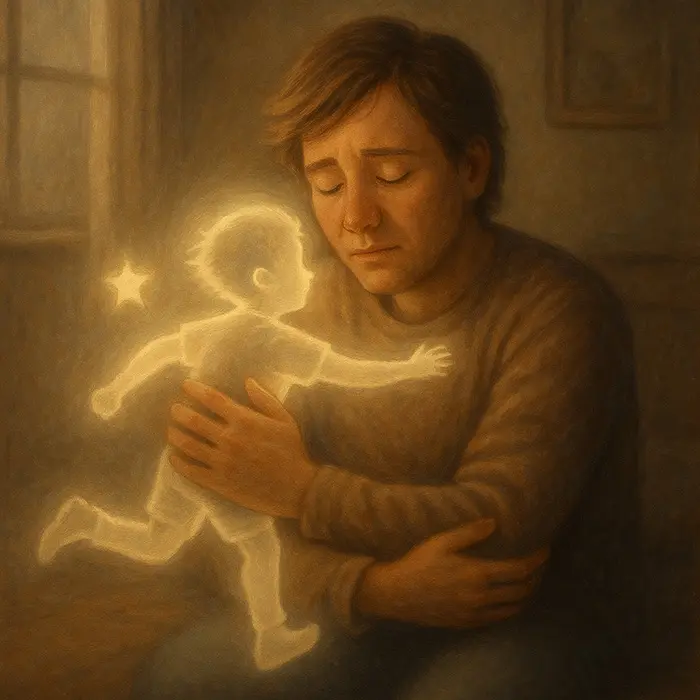
This attachment isn’t just personal; society piles on the pressure too, making it harder to let go.
Societal Pressures: The Fear of “Losing” Who You Were
Society loves slapping labels on us, right? “Successful,” “tough,” “always positive” and when we outgrow ’em, there’s this fear we’ll be seen as failures or flakes. I mean, think about how friends react when you change: “You used to be so outgoing!” It stings ’cause it implies you’re “losing” something valuable. From a cultural lens, especially in high-achiever circles, slowing down feels like betrayal like you’re ditching the hustle culture that praised you.
A client once told me she feared “losing” her rep as the family rock after therapy helped her set boundaries; society equates strength with endless giving. Hormonally, this fear spikes cortisol, ’cause change threatens social belonging our brains are wired for tribe approval. But screw that; real growth means redefining success on your terms. Psychology Today’s article on societal expectations and grief hits this spot on. And for LGBT+ folks, pressures to “fit in” pre-transition or coming out amplify the fear grieving that “acceptable” mask while embracing your true self can feel rebellious yet lonely.

Trauma adds another layer, turning past selves into safety nets we hate to cut.
Trauma’s Role in Past Selves
Trauma glues us to past versions ’cause they were our survival mode like the hyper-vigilant you after a bad breakup, always on guard. Letting that go means facing vulnerability, which scares the heck outta ya. It’s not just emotional; trauma rewires the amygdala, making old coping roles feel like lifelines. Remember that time in college when stress made me a workaholic?
Deeper trauma healing
It was my shield against family chaos, and grieving it felt like exposing old wounds. In behavioral psych, this is trauma bonding with self past selves protected us, so mourning ’em brings up unresolved pain. But acknowledging it? That’s where healing starts. From a neuro view, processing trauma lowers inflammation-linked hormones like adrenaline, easing the grief. For LGBT+ peeps, trauma from discrimination can make grieving pre-acceptance selves intense those “tough” facades saved you, but now they’re chains.
See our guide on letting go of past wounds: Dive into our deeper dive on healing from emotional wounds for practical steps. External wise, APA’s guide on trauma and identity is gold.

Understanding these roots helps when comparing this grief to other emotional tangles, like when it gets stuck or hidden.
Comparing Grieving Past Self to Similar Emotional Struggles
It’s easy to mix up grieving your past self with other grief types, but spotting the differences can clarify why you’re feeling off. Like, is it just normal sadness or something deeper that’s keeping you looped? We’ll break it down in a table first, then zoom in on specifics. For related reads, our piece on emotional self-care during change might help untangle things.
| 🟨 | Grief Type | Definition | Symptoms | Coping Tips |
|---|---|---|---|---|
| Grieving Past Self | Mourning evolved versions of you during growth. | Nostalgia mixed with progress, subtle sadness. | Journal old roles, celebrate new wins gently. | |
| Repressed Grief | Buried emotions from unprocessed losses. | Irritability, numbness, sudden outbursts. | Therapy to unpack, mindfulness to notice. | |
| Maladaptive Grief | Stuck in mourning, preventing forward movement. | Prolonged depression, avoidance of change. | Set small goals, seek support groups. | |
| Shadow Grieving | Unconscious mourning of hidden self-aspects. | Vague unease, self-sabotage patterns. | Shadow work journaling, professional guidance. |
This table shows how they overlap but differ handy for self-checks.
Grieving Past Self vs. Maladaptive Grief: When Sadness Turns Stuck
Grieving past self is like a passing rain; maladaptive grief is a storm that won’t quit, turning temporary sadness into chronic stuckness. With past self grief, you feel the pang but keep moving like missing an old job while thriving in a new one. Maladaptive? It’s when you sabotage the new gig ’cause you can’t let go, leading to isolation or regret loops. Psych-wise, maladaptive involves prolonged cortisol spikes, messing with mood regulation. A friend got stuck after divorce, idealizing her “married” self so much she avoided dating for years. Vs. healthy grieving, where you integrate lessons. Mind’s article on complicated grief explains the trap well.
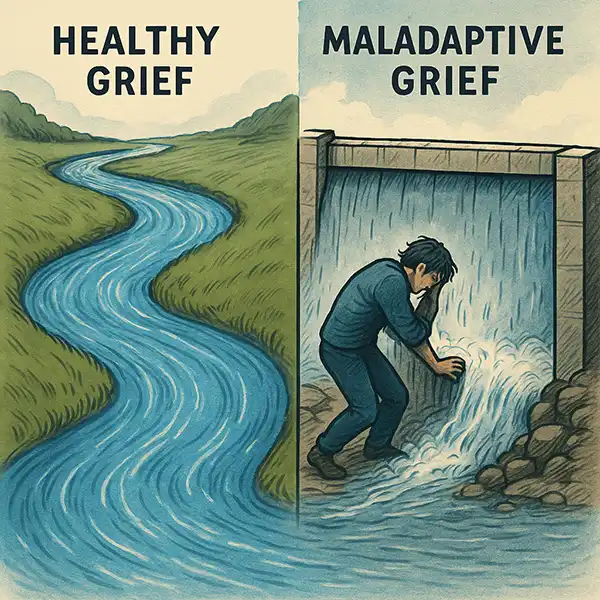
Shadow grieving adds unconscious twists, making it even sneakier.
Vs. Shadow Grieving: The Unconscious Layers
Shadow grieving is that under-the-radar stuff, where you’re mourning parts of yourself you don’t even admit exist like the “angry” side you repress. Vs. grieving past self, which is more conscious (you know you’re missing ambitious you), shadow’s hidden in the psyche, per Jungian theory. It shows as vague discontent, like self-sabotage without knowing why. I once shadow-grieved my “people-pleaser” self after boundaries; unconsciously, I missed the approval it brought. Neurons in the default mode network fire up suppressed traits, causing unease. For LGBT+ experiences, shadow grieving might involve unspoken shame from internalized homophobia mourning “acceptable” shadows while emerging. External: Greater Good’s take on shadow work.
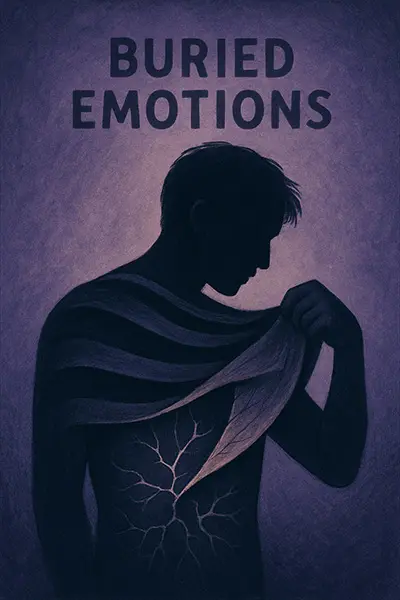
And then there’s imaginary grief, which might seem similar but doesn’t quite match here.
Vs. Other Forms Like Imaginary Grief (And Why It Might Not Fit Here)
Imaginary grief is mourning “what ifs” like grieving a life you never had, say, kids you didn’t have. Vs. past self grieving, which is about real versions you lived, imaginary’s all hypotheticals, more fantasy-based. It doesn’t fit ’cause past self grief has tangible memories, not just dreams. Why compare? ‘Cause both stir regret, but imaginary can lead to unproductive rumination without the growth payoff. In psych, imaginary ties to anticipatory grief, prepping for potential losses. A gal I know grieved an “imaginary” career as a musician she never pursued, but it wasn’t past self more unlived potential. Doesn’t align here ’cause our focus is on lived evolutions. For more, our post on navigating emotional what-ifs.
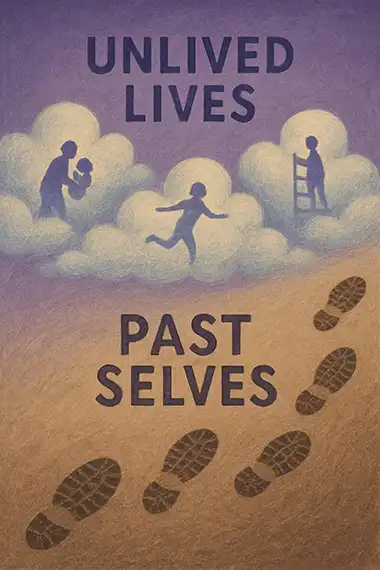
Once you spot these differences, navigating the stages of this grief gets clearer, starting with denial.
Stages of Grieving and Embracing Your New Self
Grief ain’t linear, but thinking in stages helps map the mess like a roadmap for your heart. We’ll hit denial, sadness into acceptance, and integration, with tips on non-judgy acceptance. It’s inspired by Kubler-Ross but tweaked for self-evolution. Harvard Health’s grief stages overview adapts well here.
Denial: Pretending the Old You Still Fits
Denial’s that phase where you fake it, squeezing into old jeans that pinch metaphorically, forcing past habits ’cause admitting change hurts. “Nah, I’m still the party animal,” you say, even as hangovers hit harder. Brain-wise, it’s the prefrontal cortex resisting rewiring. I denied grieving my “adventurer” self post-kids, booking trips that exhausted me. It’s protective, but prolongs pain. Tip: Notice when “fitting” feels forced.
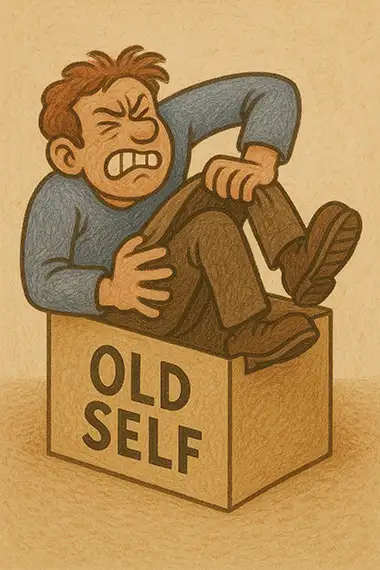
Sadness follows, but with acceptance, it softens into something healing.
Sadness and Acceptance: Allowing the Loss
Sadness hits like a wave tears over old photos, that ache for “simpler” times. But acceptance? It’s whispering, “Yeah, that me was great, but this one’s evolving.” Allow it without rush; cry, journal. Hormonally, serotonin balances as you process. A queer friend accepted grieving her “closeted” resilience it hurt, but freed her. Our guide on emotional regulation has tools like deep breathing.
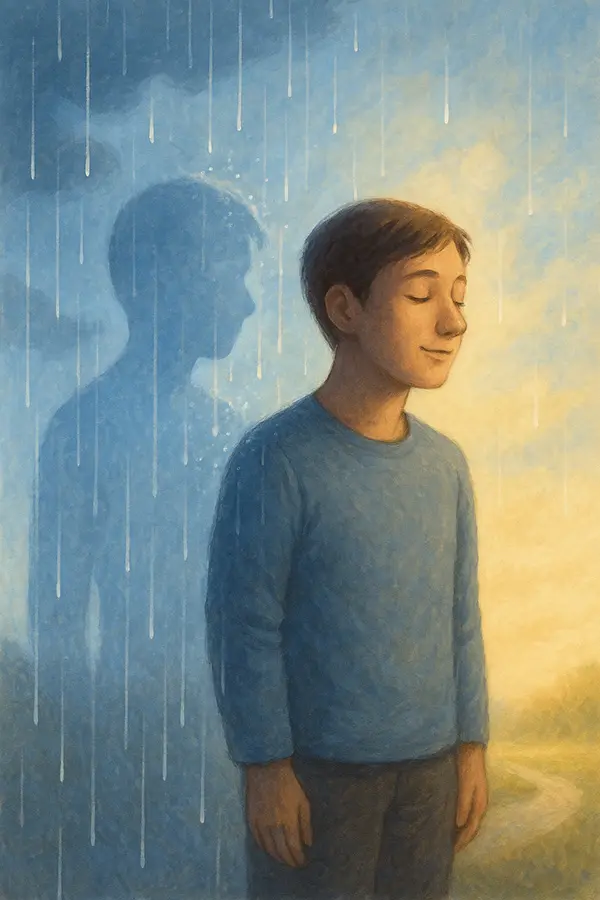
Integration blends it all, turning lessons into your new foundation.
Integration: Blending Lessons from Past to Present
Here, you weave old strengths into now like taking that ambitious drive but adding balance. It’s alchemical, turning grief gold. Neuroplasticity shines; new pathways form from reflected experiences. I integrated my workaholic grit into mindful productivity better boundaries, same fire. Practical: List three past lessons daily.
How to Accept Your Past Self Without Judgment
Accepting without judgment means viewing old you kindly, like a kid who tried hard. No “I was dumb” instead, “I did my best then.” Techniques: Compassion meditation, where you hug that version mentally. A tip: Write a letter forgiving past mistakes. In LGBT+ journeys, this means honoring survival modes without shame. External: Self-compassion.org on non-judgmental acceptance. It eases the blend.

Practical Tools to Honor and Heal Your Past Self
Okay, so you’ve spotted the grief, dug into why it’s there now what? Tools, my friend. Simple stuff that actually works, like scribbling letters or breathing through the ache. I remember after ditching my old job, I felt this weird void, so I tried writing a “goodbye” note to that stressed-out version of me. It was kinda cheesy at first, but man, it helped release some tension. These aren’t quick fixes they’re gentle ways to say, “Hey, past me, thanks for getting me here.” From a neuro angle, practices like these rewire your brain’s attachment circuits, lowering cortisol and boosting oxytocin for that self-hug feel. We’ll start with writing, then mindfulness, and wrap with curiosity rituals. Psychology Today’s guide on self-compassion tools backs this up if you wanna dive deeper.
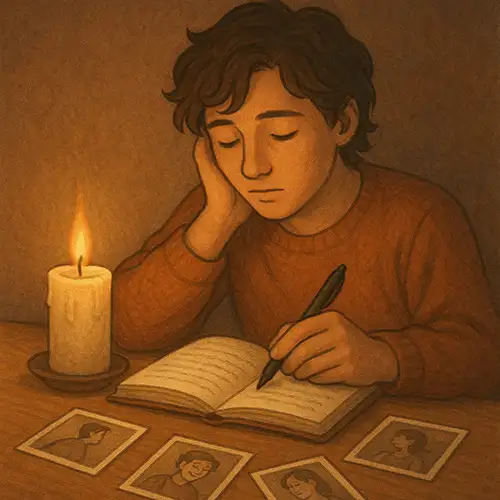
Writing Exercises: Goodbye Letters and Reflection Prompts
Writing’s like therapy on paper no appointment needed. Try a goodbye letter: address it to your old self, thank ’em for the lessons, forgive the mistakes, and wave farewell. I wrote one to my “people-pleaser” phase, saying stuff like, “You kept me safe, but I’m ready for real connections now.” It teared me up, but afterward? Lighter chest, clearer head. Reflection prompts help too: “What did that version teach me?” or “What am I gaining by letting go?” Jot daily for a week. In LGBT+ journeys, this hits home grieving pre-transition selves, honoring their survival without clinging. It’s not about erasing; it’s integrating. For more prompts, check our post on mindful journaling for emotional healing.

Mindfulness Practices: Self-Compassion Meditations
Mindfulness isn’t all zen and empty minds it’s meeting your grief with kindness. Start with a self-compassion meditation: sit quiet, hand on heart, whisper, “I’m allowed to miss who I was.” I do this when nostalgia hits hard, like missing my carefree college days, and it softens the edges. Apps like Insight Timer have guided ones for loss. Science says it activates the parasympathetic system, calming amygdala freakouts. For folks in the queer community, meditations on identity shifts can affirm, “You’re evolving, not losing.” Simple, right? But powerful. Link to our mental self-care guide for more breathwork tips.
How to Heal Past Versions of Yourself Step-by-Step
Step 1: Acknowledge name the feeling, “I’m grieving my ambitious self.” Step 2: Feel it sit with the sadness, no judging. Step 3: Honor it light a candle or play an old song. Step 4: Release visualize handing off the baton to your new you. Step 5: Integrate ask, “What strength from then can I keep?” I followed this after a breakup, and it turned pain into fuel. Easy? Nah. Worth it? Totally. Verywell Mind’s healing from loss steps echoes this.
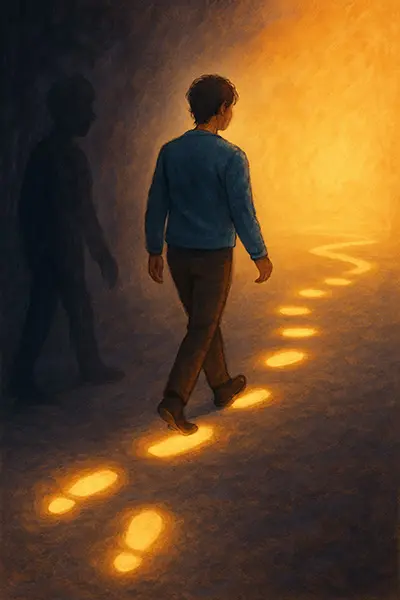
Curiosity flips the script from loss to excitement about what’s next.
Curiosity Rituals: Exploring “Who Am I Becoming?”
Get curious with rituals like a “future me” vision board cut mag pics of dreams, or daily ask, “Who am I becoming today?” I started this during a career pivot, and it shifted my focus from “lost” to “gaining.” It’s like turning grief into a treasure hunt. From psych, curiosity spikes dopamine, countering grief’s drag. For LGBT+ peeps, exploring post-coming-out identities can feel empowering, answering “Am I still me?” Yep, just upgraded. Tie it to our knowing yourself post.
These tools set the stage for real stories of folks who’ve been there.
Real-Life Scenarios: Stories of Grieving and Growing
Stories make this stuff real, y’know? Not just theory, but messy human experiences. Like my neighbor who outgrew her party-girl phase after kids she grieved the freedom, but found deeper joy in quiet nights. We’ll look at a high-achiever case and relationship shifts. Brain-wise, sharing stories normalizes it, reducing isolation via mirror neurons. If you’re wondering, “Is sensitivity bad?” Nah, it’s what makes growth stories poignant.

Case Study: Outgrowing a High-Achiever Identity
Take Sarah, a former exec who burned out and switched to teaching. She grieved her “power suit” self, missing the adrenaline, even as she loved the balance. “I felt like a failure at first,” she said. But therapy helped her see it as evolution. Stats show many high-achievers face this 70% report nostalgia in transitions, per Human Flourishing Lab. In queer contexts, outgrowing “overachiever” masks from minority stress adds layers. Sarah’s tip: Celebrate small wins in the new role.
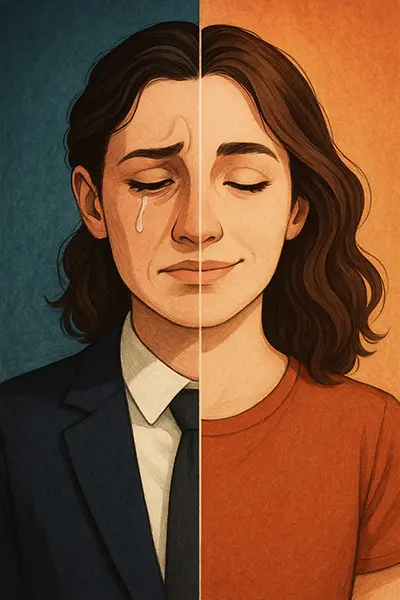
Scenario: Letting Go of Old Relationships and Roles
Imagine ditching a toxic friendship circle you grieve the laughs, but gain peace. My buddy did this post-coming-out; old roles didn’t fit his authentic self. “It hurt, like losing family,” he shared. But new bonds bloomed. Hormones play in: oxytocin dips from lost connections, but rebounds with healthy ones. Common? Yeah, especially in life shifts. For more on boundaries, our emotional boundaries guide.
🟨 Quick Stats on Personal Growth Grief
- 77% find nostalgia comforting in uncertain times (Human Flourishing Lab).
- Young adults 60% less likely to nostalgiate, but it ramps up with age (PubMed study).
- Ambiguous loss affects many in transitions, like 9.8% prolonged grief rate globally (PMC meta-analysis).
Source: Various psych studies; check full links for deets.
These scenarios highlight checklists to keep you on track.
Checklist for Navigating Grief in Growth
Checklists are lifesavers when emotions swirl they ground you. We’ll cover daily progress, prevention, and self-love ones. Think of ’em as road signs. Neurologically, checking boxes releases endorphins, motivating momentum. “Does everyone feel this?” Pretty much, yeah.
Daily Progress Checklist: Signs You’re Moving Forward
- Feeling lighter after journaling? Check.
- Noticing new joys? Double check.
- Less rumination on “what was”? Progress! I tick this when old habits fade. For queer growth, add: Embracing identity without apology.
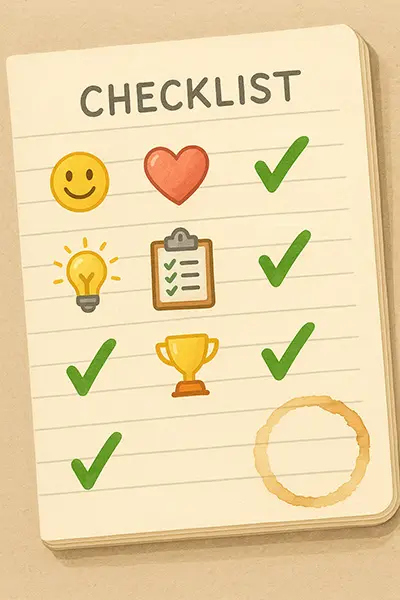
Prevention Checklist: Avoiding Clinging to Outdated Selves
- Question habits: “Does this serve now?”
- Set boundaries on nostalgia scrolling.
- Surround with growth-minded folks. Avoided a relapse by this once. Prevention beats cure.
Self-Love Checklist: Building Acceptance Post-Grief
- Daily affirmation: “I’m worthy as I am.”
- Treat yourself kindly, like a friend.
- Celebrate evolutions, big or small. Builds resilience.

How to Let Go of the Past and Love Yourself
Combine checklists: Start with prevention, track progress, end with love. Step: Forgive daily. I learned this the hard way, but it sticks. External: APA’s self-love tips.
Watch for when grief goes too deep, though.
Warning Signs: When Grief Needs Professional Support
Sometimes grief whispers; other times it screams. Red flags mean time for help. Isolation hit me once, and therapy pulled me out. Brain overload from prolonged grief spikes anxiety hormones. “Is it normal?” Up to a point yes.
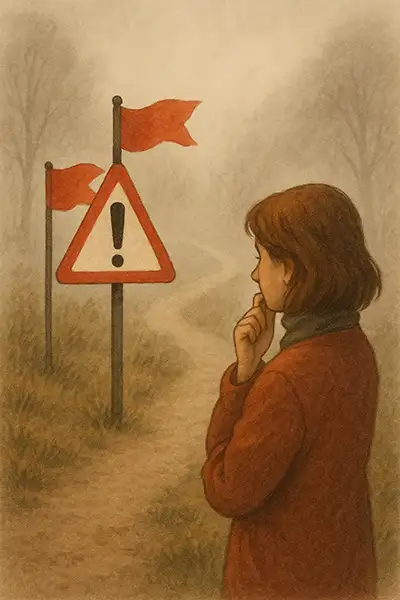
Red Flags: Prolonged Isolation or Overwhelm
If you’re ghosting friends or tasks pile up endlessly, flag it. Overwhelm feels like constant fog. In LGBT+ shifts, added stigma amps isolation. Spot it early.
When to Seek Help: Therapy for Deeper Identity Shifts
Therapy shines for stuck grief EMDR or talk therapy unpacks layers. I went when identity wobbles post-change. Common in transitions.
How Do I Find My True Self Again? (With Referral Tips)
Ask: “What lights me up now?” Referrals: BetterHelp for queer-friendly therapists, or local centers. True self’s always there; grief just clouds it. Link to our emotional healing guide.
Research backs why this happens and how common it is.
Research and Insights on Grief in Personal Growth
Diving into studies demystifies this hidden grief. Ambiguous loss theory, per Pauline Boss, fits identity changes perfectly. We’ll hit studies and stats. From neuroscience, limbic shifts during evolution mimic loss responses.
Studies on Ambiguous Loss and Identity Change
Boss’s work shows ambiguous loss in transitions like gender shifts causes chronic sorrow but builds resilience when processed. A study on trans folks highlighted friction from “absent yet present” old selves. Eye-opening for personal evo.
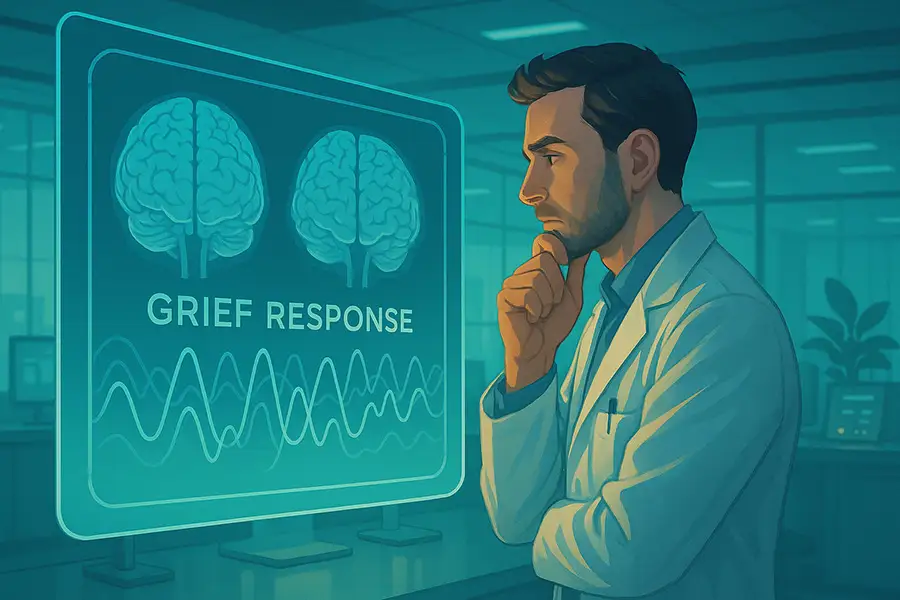
Statistics: How Common Is This “Hidden” Grief?
Around 77% turn to nostalgia in tough transitions for comfort. Prolonged grief hits 9.8% globally, often ambiguous. Nostalgia rises with age, per PubMed. You’re not alone.
🟨 Chart: Timeline of Grief Stages in Self-Evolution
Based on Kubler-Ross adapted:
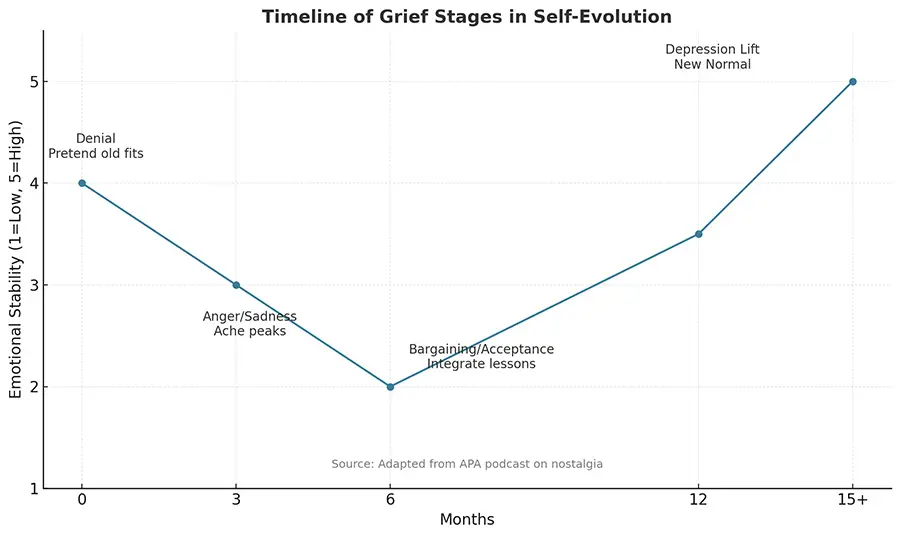
Got questions? We’ve got answers.
Frequently Asked Questions (FAQ)
It’s that ambiguous grief sneaky loss of familiar self amid gains. Like upgrading phones but missing the old one’s quirks. Normal? Yep. Process it, and sadness fades.
Totally. Dreams evolve; grieving ’em honors your journey. “Bad to change?” Nah, it’s growth.
Varies 3-12 months, per studies on transitions. If stuck, seek help.
Red flag time therapy unsticks it. Tools like meditation help, but pros dig deeper.
Oh yeah, brain resists even good shifts. Pain’s temporary; freedom’s lasting.
Rituals like letters celebrate without backsliding. Balance honor and forward.
Most do, especially in big changes 77% nostalgic in uncertainty. Sensitivity ain’t bad; it’s aware.
Wrap up with resources to keep the healing going.
Resources and Links for Further Healing
Resources are your growth toolkit books, sites, communities. Final thought: Grieving past you isn’t weakness; it’s paving for the best version. Try a tool today embrace that evolution. ? For more serenity, subscribe or share your story below.
Books and Articles on Emotional Evolution
“Ambiguous Loss” by Pauline Boss gold for understanding. NYT piece on no closure vibes.
Online Tools and Communities for Support
Reddit’s r/personalgrowth for shares. The Trevor Project for LGBT+ grief support.
Related Reads on PathSerenity (Internal Links)
Dive into why emotions feel too much, mental self-care, or knowing yourself.
✨ Last updated on 23.08.2025
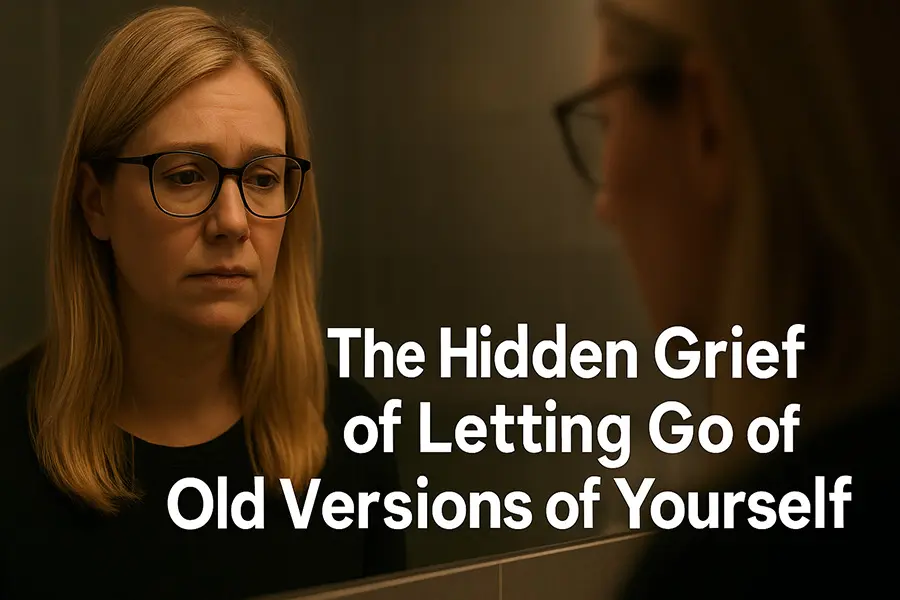










Leave a Reply